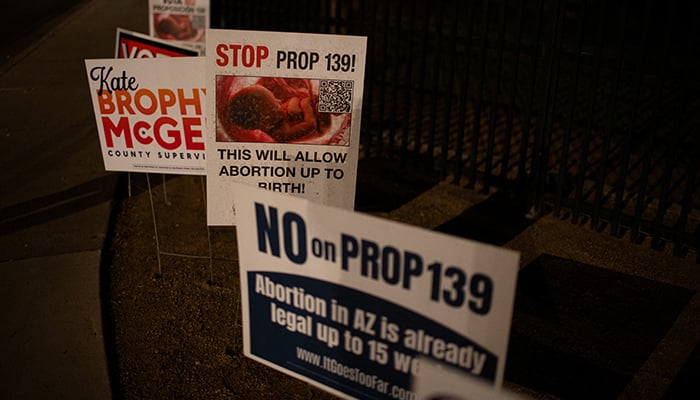
Donald Trump’s second presidential term could herald a new wave of attacks on abortion access across the United States — with or without a Republican-controlled Congress.
Here’s a closer look at the legal tools available to a future administration intent on curtailing the right — and how abortion rights advocates are preparing to respond.
Federal procedures
For abortion rights advocates, the nightmare scenario is that a Republican-controlled Congress enacts sweeping national restrictions or an outright ban.
But even without that, Trump could “do a lot of damage to abortion access” through federal actions and judicial appointments, American University law professor Louis Grossman said. Agence France-Presse.
The Supreme Court’s selection of the former Republican president was pivotal in dismantling decades of legal precedent protecting the national right to abortion.
And while Trump at times hinted at moderation during the 2024 campaign — even suggesting he might veto any anti-abortion “ban” that reaches his desk — some fear the 2025 project is the real battle plan.
The document, published by the ultra-conservative Heritage Foundation, offers a roadmap for tougher limits on executive power, developed with input from former Trump officials. Trump has publicly distanced himself from the document.
New conditions on abortion pills
Experts expect abortion pills to be Trump’s first target.
Mifepristone, which prevents pregnancy from developing, and misoprostol, which emptyes the uterus, accounted for nearly two-thirds of miscarriages in the United States last year, according to the Kaiser Family Foundation.
Medical abortion required clinic visits. However, President Joe Biden’s government made prescriptions via telehealth and pills in the mail permanent in 2021.
The Trump administration may reimpose the personal requirements or roll back other relaxed regulations, a simpler step than revoking approval, though that is also possible, said Sonia Souter, a law professor at George Washington University.
Reviving obscenity law
Anti-abortion activists are looking to the Comstock Act, a 19th-century law that prohibits the mailing of “obscene” material, including material intended to “produce abortion.”
The US Department of Justice under Biden currently interprets this law as not applicable to approved abortion pills.
But Sutter said Agence France-Presse That a broad interpretation could apply to “anything used to produce an abortion – surgical abortion materials – which could effectively trigger a national ban.”
This could disrupt the supply chain at clinics and hospitals across states where abortion is currently legal — or where it may soon be allowed through statewide referendums on November 5.
“There is nothing nefarious or ‘backdoor’ about enforcing laws that Congress has enacted and repeatedly reaffirmed,” said conservative lawyer and scholar Josh Craddock. Agence France-Presse.
Judicial appointments and others
The Trump administration could also seek to roll back strict patient privacy protections that Biden put in place for women seeking out-of-state abortions, paving the way for potential prosecutions when they return home, Souter said.
Although the Supreme Court’s conservative majority has already overturned Roe v. Wade, experts say the appointment power of federal judges remains paramount.
Courts may soon be called upon to decide the fate of state laws that make it harder for women to get care in states that are more abortion-friendly, Grossman explained.
The fighting begins
Abortion rights advocates quickly described Trump’s election victory as a “deadly threat.”
Nancy Northup, president of the Center for Reproductive Rights, warned in a statement on Wednesday that a second Trump administration would exacerbate the “harms” of the first administration “with new harms, and perhaps much worse.”
“We will strongly oppose any and all attempts to roll back progress,” she added, pledging “to take the fight to them at every turn.”
